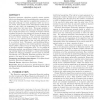Free Online Productivity Tools
i2Speak
i2Symbol
i2OCR
iTex2Img
iWeb2Print
iWeb2Shot
i2Type
iPdf2Split
iPdf2Merge
i2Bopomofo
i2Arabic
i2Style
i2Image
i2PDF
iLatex2Rtf
Sci2ools
148
click to vote
PODC
2006
ACM
2006
ACM
Self-stabilizing byzantine agreement
Byzantine agreement algorithms typically assume implicit initial state consistency and synchronization among the correct nodes and then operate in coordinated rounds of information exchange to reach agreement based on the input values. The implicit initial assumptions enable correct nodes to infer about the progression of the algorithm at other nodes from their local state. This paper considers a more severe fault model than permanent Byzantine failures, one in which the system can in addition be subject to severe transient failures that can temporarily throw the system out of its assumption boundaries. When the system eventually returns to behave according to the presumed assumptions it may be in an arbitrary state in which any synchronization among the nodes might be lost, and each node may be at an arbitrary state. We present a self-stabilizing Byzantine agreement algorithm that reaches agreement among the correct nodes in optimal time, by using only the assumption of bounded messa...
Byzantine Agreement Algorithm | Correct Nodes | Distributed And Parallel Computing | Enable Correct Nodes | PODC 2006 |
Related Content
| Added | 14 Jun 2010 |
| Updated | 14 Jun 2010 |
| Type | Conference |
| Year | 2006 |
| Where | PODC |
| Authors | Ariel Daliot, Danny Dolev |
Comments (0)

